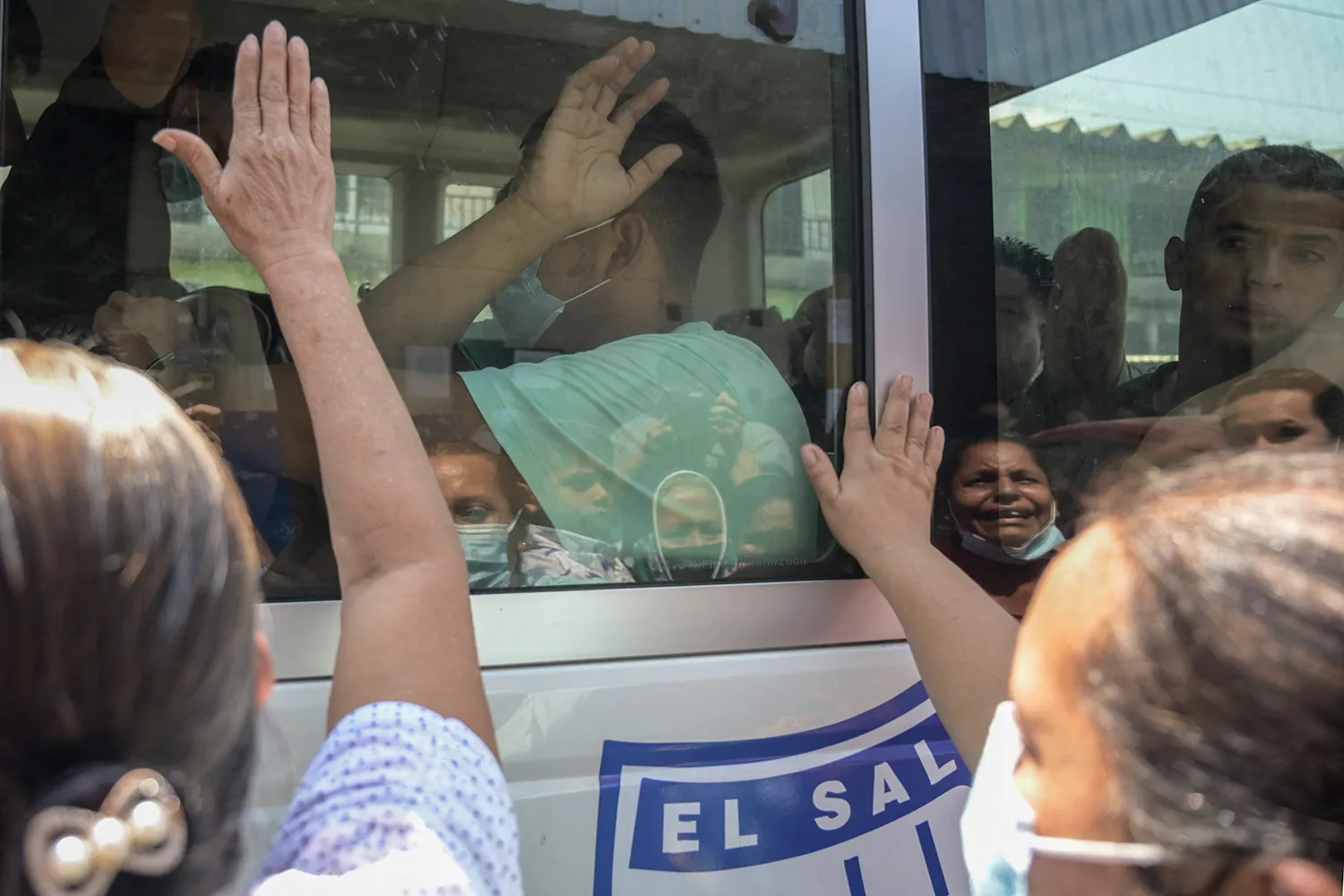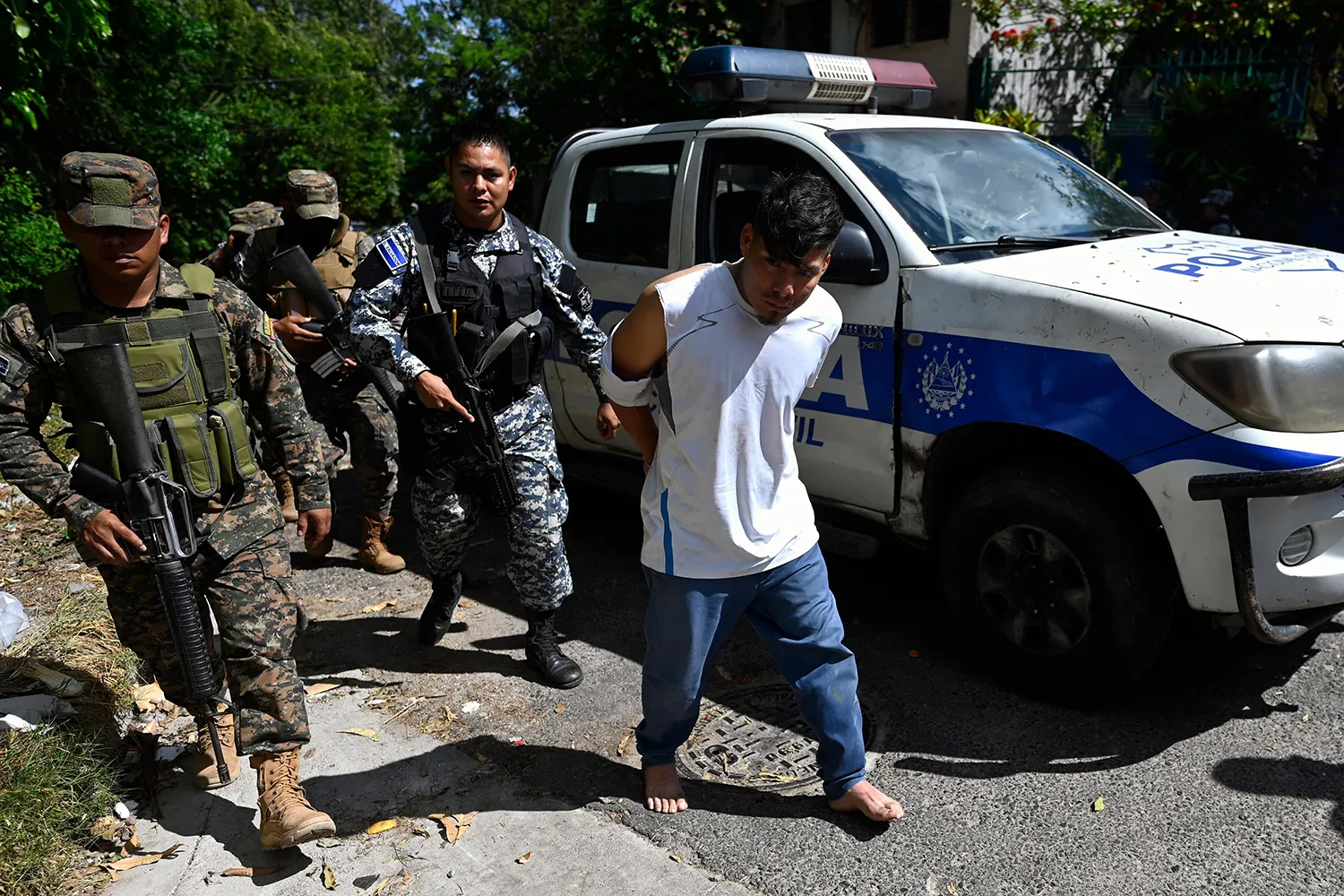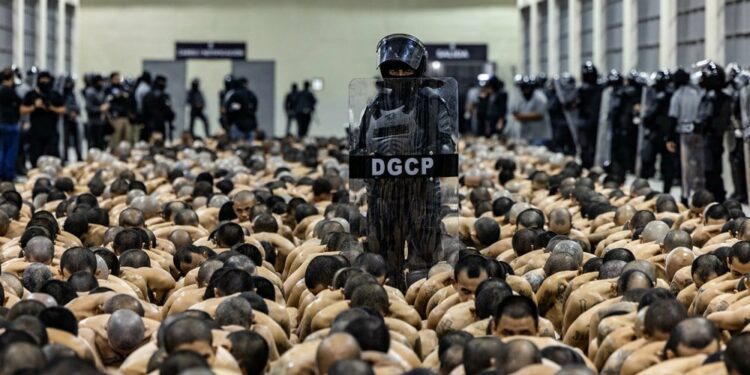Soldiers keep watch near to the crime scene where five market vendors and one private security guard were killed during what was allegedly a fight between gangs, seen in San Salvador on March 15, 2017.Marvin Recinos/AFP via Getty Images
In both 2015 and 2016, El Salvador recorded more homicides than any other country in the world. At its peak in 2015, the country had a homicide rate of 105 per 100,000 people. By the end of the presidency of Salvador Sanch├йz Cer├йnтАФand in the wake of a 2016 gang nonaggression pactтАФthe murder rate had fallen to just 53 people per 100,000.
In 2019, Bukele ascended to the presidency on a populist, anti-establishment platform that focused on social renewal and made little mention of ironfisted crime policies. Almost immediately, he began a three-year period of secret gang negotiations and diplomacy, which saw the homicide rate fall to just 18 people per 100,000 in 2021. After a weekend of heightened gang violence in March 2022, Bukele, with the support of the legislature, launched the dramatic crackdown known as the r├йgimen de excepci├│n, which suspended several basic constitutional rights and was followed by aggressive criminal reforms. The provisional, 30-day r├йgimen de excepci├│n has become increasingly permanent, having now been extended a total of 28 times, and in 2023 the countryтАЩs reported homicide rate plunged to just 2.4 people per 100,000.
However, under BukeleтАЩs crackdown, the government has been undercounting homicides by as much as 47 percent. This is no bureaucratic or clerical error. Since taking office, BukeleтАЩs administration has been laser-focused on reducing homicide rates and improving perceptions of security. This was central to his administrationтАЩs negotiations with the gangs from 2019 to 2022.
The government offered incarcerated gang leadership less-restrictive prison conditions, reduced sentences, visits to civilian hospitalsтАФoften to communicate with fellow gang members under the guise of receiving fake medical treatmentтАФand a promise to not extradite them to the United States. In exchange, the gangs needed to find ways to lower the number of homicides. One of the ways in which gang leaders achieved this was to authorize fewer killings and genuinely reduce violence.
However, they also increased the practice of burying the bodies of victims in unmarked and often mass gravesтАФin effect, reducing the number of тАЬpublic killings.тАЭ According to a 2022 U.S. federal indictment, during the negotiations, тАЬMS-13 leaders continued to authorize murders where the victimsтАЩ bodies were buried or otherwise hidden.тАЭ
In May 2021, BukeleтАЩs government formally started changing how it counted homicides. Mesa T├йcnica, an interagency roundtable that tabulates homicides, began excluding the discovery of clandestine or unmarked graves from its counts. In a country ravished by a 12-year civil war that ended in the 1990s, discoveries of mass graves and unidentified human remains are an all-too-common occurrence, and for as long as the government had been recording homicide data, these deaths had been included.
Marvin Reyes, the leader of the Salvadoran national police union, told Foreign Policy that as the homicide numbers were dropping during BukeleтАЩs first years in office, тАЬwe began to find more unmarked and clandestine graves where the gangs would bury their victims.тАЭ Since the start of 2021, at least 171 unmarked graves have been discovered (68 in 2021, 43 in 2022, and 60 in 2023) and entirely left out of the nationтАЩs homicide figures.
Then, in April 2022, just days after Bukele declared the r├йgimen de excepci├│n, the government began excluding figures for persons killed in clashes with the police or military, which include shootings, patrols, and operations by state security forces. El SalvadorтАЩs National Civil Police refers to these incidents as тАЬillegitimate aggressionsтАЭ or тАЬlegal interventions,тАЭ which therefore fall outside the realm of intentional homicide.
For context, in the United States, these killings are also counted separately and are called тАЬwillfulтАЭ and тАЬjustifiableтАЭ homicides. If you were to count people killed by police in the United States in 2022 as official homicides, the national homicide rate would go up by 6 percent. In El Salvador, the inclusion of these killings in the data would increase the homicide rate by 19 percent in 2022 and 20 percent in 2023.
Security forces in El Salvador have a uniquely troubling history of extrajudicial killings. In his book Los Muertos y el Periodista, Salvadoran journalist Osc├бr Mart├нnez wrote, тАЬWhen the police say clashes, it probably means тАШmassacre.тАЩтАЭ Since the Bukele government stopped including police killings in its homicide data, 122 people have been killed in clashes with security forces (92 in 2022 and at least 30 in 2023).
Where El Salvador has become a true leaderтАФnot only in the Western Hemisphere but globallyтАФis incarceration. Under BukeleтАЩs rule, El Salvador has become the most incarcerated country in the world. As a result of arbitrary detentions, prolonged sentences, and mass trials, 1.6 percent of the Salvadoran population is now behind barsтАФmore than twice the incarceration rate of Cuba and Rwanda and more than four times that of the United States.
As it happens, the last type of homicide that is now omitted from the Salvadoran governmentтАЩs data is murders that occur in prisons. It is unclear precisely when the government stopped including these figures in the official counts, but data from government records and civil society organizations indicates that homicides in prison have increased dramatically under the r├йgimen de excepci├│n. During BukeleтАЩs first two years in office, only 16 people died from homicide while under prison custody, and homicides accounted for just 8 percent of total prison deaths. Since then, the number of homicides in prisons has skyrocketed. Detailed data from Socorro Jur├нdico Humanitario, a nonprofit legal aid organization, indicates that in the two years since the crackdown was launched, 91 people have been killed in prison, meaning that homicide is now the leading cause of death in the prison system today.
Some may note that the United StatesтАЩ FBIтАЩs Supplementary Homicide Report also excludes prison homicides from its national homicide count. However, this is merely because that data is sourced from law enforcement, not correctional facilities. The United States actually uses two collection systems to track homicides, and the other oneтАФthe CDCтАЩs National Vital Statistics SystemтАФdoes include prison murders. Ultimately, a homicide behind bars would seem to be an equally valid indicator of societal violence as one on the street.
Given the significant changes to El SalvadorтАЩs methodology for reporting murders and the quantitative data available, this analysis finds that under Bukele, homicides have been undercounted on average by nearly 27 percent since 2021, and by 33 percent since Bukele launched the crackdown in spring 2022. In 2023, Bukele claims to have reduced the number of homicides to 154, thus lowering the murder rate to just 2.4 homicides per 100,000 people. The data suggests that the real number of homicides in El Salvador last year was 288, and that the real murder rate was 4.5тАФa staggering undercount of 47 percent.
While the reduction in violence and the dismantling of the gangs under Bukele has certainly been remarkable, El Salvador is simply not the safest country in the Western Hemisphere, as he likes to claim. Even if one were to ignore reports of mass repression and human rights violations by the government, El Salvador, in its most generous reading, would only be the safest country in Central America.

Prisoners are loaded onto a bus while mourning family members press their hands to the glass. from outside. One of the prisoners lifts his hand to wave to them.
El Salvadorans captured for alleged gang links are escorted by the National Civil Police following the declaration of the r├йgimen de excepci├│n, seen in San Salvador on March 29, 2022. Marvin Recinos/AFP via Getty Images

Police and soldiers escort people captured alongside a police vehicle during an operation against gang members. The detainee closest to the camera has his hands behind his back and bare feet.
Police and soldiers escort people captured during an operation against alleged gang members in Soyapango, El Salvador, on Dec. 3, 2022. Marvin Recinos/AFP via Getty Images
For the United States, none of this may matterтАФneither the Kafkaesque judicial processes, nor a calcifying autocracy, nor the nuances of violence reduction strategies. Ultimately, migration is the primary lens through which Washington engages with Bukele and his country. Yet BukeleтАЩs presidency has hardly been a force for reducing irregular migration to the United States. Although the number of Salvadorans apprehended at the U.S. border dropped in 2023, in the past three years, more Salvadorans have been apprehended at the border than any comparable period in the past two decades.
Nowadays, when a Latin American country experiences escalating crime, there is invariably a conversation about the Bukele option. Yet the r├йgimen de excepci├│n, which is so often singularly framed as the Bukele model, is neither a document of public policy, a piece of legislation, nor a defined security strategy. In its truest form, it is a prolonged suspension of four constitutional guaranteesтАФthe right to assembly, legal counsel, private communication, and limits to pretrial detentionтАФfollowed by a series of draconian sentencing reforms, which have collectively enabled mass incarceration on an unprecedented scale. Under Bukele, these temporary and exceptional measures have effectively been transformed into what Italian philosopher Giorgio Agamben describes as тАЬa permanent technique of government.тАЭ
Rarely mentioned in the conversation are also BukeleтАЩs three years of secret gang negotiations, a period in which arrests fell by 25 percent, and yet official reported homicides plunged by 66 percent. Nor are the stark differences between El Salvador and other Latin American countries with burgeoning crime epidemics, such as Ecuador and Haiti. El SalvadorтАЩs criminal landscape has been dominated for decades by three unsophisticated street gangs that had little to no involvement in the international drug trade and derived the majority of their revenue from petty extortion. By comparison, Ecuador┬аhas become a critical transit point for some of the most sophisticated drug cartels in the world, and┬аHaitiтАЩs tragedy is one marked by a unique cascade of political instability, state collapse, economic crisis, and (as some argue)┬аcriminal insurgency.
Lastly, both BukeleтАЩs supporters and critics have largely taken his administration at its word, failing to consider that the very data touted by the president and his administration is deeply flawed and that homicides under his rule have been deliberately and dramatically undercounted.
тАЬEveryone is talking about BukeleтАЩs model and that it is going to be successful there,тАЭ Salvadoran political scientist Jos├й Miguel Cruz told Foreign Policy, тАЬand that is just a fantasy.тАЭ
Source link : http://www.bing.com/news/apiclick.aspx?ref=FexRss&aid=&tid=66b513a2674a429fabb1bd1a312363fa&url=https%3A%2F%2Fforeignpolicy.com%2F2024%2F08%2F08%2Fel-salvador-bukele-crime-homicide-prison-gangs%2F&c=10579837205350257876&mkt=en-us
Author :
Publish date : 2024-08-08 03:38:00
Copyright for syndicated content belongs to the linked Source.










